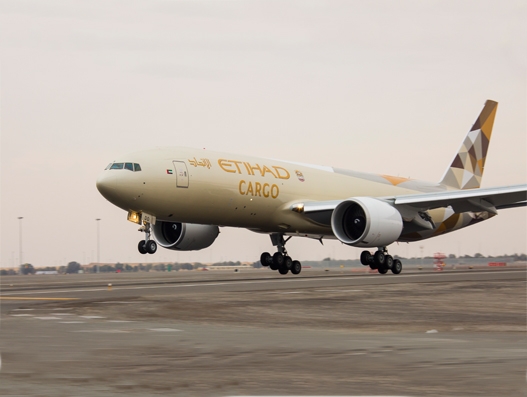
Etihad sees flat growth in cargo volumes in 2016
<p style="text-align: justify;">Feb 09, 2017: Abu Dhabi based Etihad Airways has delivered another year of sustained growth in 2016, helped by new aircraft, additional frequencies and the introduction of further world-class products.</p> <p style="text-align: justify;">The cargo division of the airline carried 592,700 tonnes, which was flat year-on-year during 2016.</p> <p style="text-align: justify;">Etihad Cargo expanded its […]

Feb 09, 2017: Abu Dhabi based Etihad Airways has delivered another year of sustained growth in 2016, helped by new aircraft, additional frequencies and the introduction of further world-class products.
The cargo division of the airline carried 592,700 tonnes, which was flat year-on-year during 2016.
Etihad Cargo expanded its freighter services to several new markets, including Columbus Rickenbacker, Ohio in the US; East Midlands and London Stansted in the UK; Copenhagen; Brussels; Addis Ababa and Casablanca in Africa; Colombo; Muscat; and Zhengzhou in China. This brings the number of freighter-only destinations to 15.
The airline carried 18.5 million guests during the year, up six percent on 2015.
The airline was also part of the evolution of Etihad Aviation Group (EAG), a wider aviation and tourism business which now also includes Etihad Airways Engineering; Airline Equity Partners; Etihad Airport Services and Hala Group. The formation of Etihad Aviation Group was announced in May 2016.
During the year, Etihad Airways operated more than 109,000 scheduled passenger and cargo flights spanning around 446 million kilometres and 112 destinations.
Etihad Airways’ fleet of 119 aircraft is one of the youngest and most environmentally-friendly in the industry, with an average age of 6 years. During the year, the airline took delivery of 10 aircraft: three Airbus A380s, five Boeing 787s and two Boeing 777-200 cargo freighters. An additional 12 aircraft are set for delivery in 2017, including nine Boeing 787s, two Airbus A380s and one A330-200 freighter.
James Hogan, president and chief executive officer of EAG, said, “2016 saw sustained growth in a very tough business environment. This is where Etihad Airways’ superior products and services show their true value and where the strength of the EAG business model comes into effect through its diversity of businesses, cost effective synergies and global spread of risk. Most importantly, in 2016 we were able to introduce our new Group structure, which positions this business for long-term growth and development.”
Etihad Airways launched Venice in Italy, Rabat in Morocco and Sabiha Gokcen in Turkey as new destinations in 2016.
The airline’s Airbus A380 began serving Mumbai and Melbourne, and the Boeing 787 Dreamliner was deployed on new routes, including Perth, Shanghai, Johannesburg and Dusseldorf. The airline added a fifth daily flight on the Doha route, an extra daily flight to Cairo and Kozhikode, and increased frequencies to Dammam, Manila and Tehran.
Etihad Airways carried more than 76 percent of the total passengers who travelled to and from Abu Dhabi International Airport in 2016. With the addition of the airline’s equity partners that operate flights into the UAE capital, the combined total rises to 86 percent of passenger traffic at the airport.
The airline’s codeshare and equity partnerships delivered 5.5 million passengers onto Etihad Airways’ flights, an increase of nine percent over the five million passengers in 2015.
The airline launched new codeshare agreements with Avianca Colombia, Avianca Brasil, Kulula, Precision Air and Montenegro Airlines.
Etihad Airways’ existing codeshares with airberlin, Alitalia, Brussels Airlines, Flynas, Jet Airways, Malaysia Airlines, Hong Kong Airlines, and Virgin Australia were significantly expanded. Etihad Airways also launched new interline agreements with Lufthansa, Pegasus, Malindo and LATAM.
Etihad Airways’ equity partner network, including airberlin, Air Serbia, Air Seychelles, Alitalia, Jet Airways, Virgin Australia and Etihad Regional, represents the seventh largest global grouping of airlines. In 2016, the combined fleet of 705 aircraft carried 126.6 million guests.
Hogan, added, “2017 will be another challenging year. We will continue to expand prudently and efficiently, reflecting the nature of the economic environment. We remain optimistic and have every belief that our robust business model will succeed and, most importantly, stand the test of time.”

